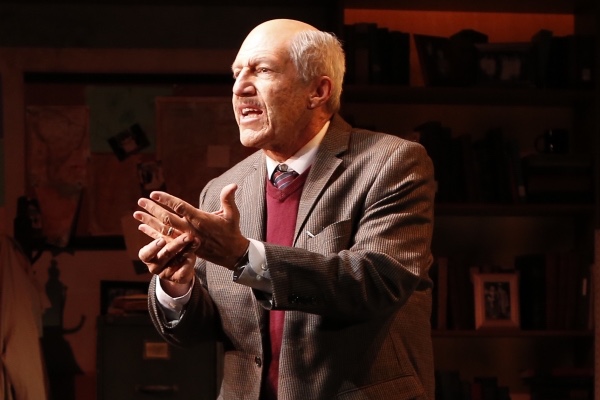The Secrets of Nazi Hunter Simon Wiesenthal

Simon Wiesenthal was one of the most famous men in the world. There have been numerous books about him, documentaries, and lengthy magazine and newspaper articles. He was a character in a half dozen movies, such as The Boys from Brazil. Starting at the end of World War II, when he was a Jewish slave labor camp survivor (most of his family died in the camps), he hunted down and captured, with others, over 1,100 Nazis, including Adolf Eichmann, head of the Jewish extermination program, the guard who arrested Anne Frank and the heads of several concentration camps, such as Franz Stangl, who ran the infamous Treblinka and killed 900,000 Jews. Wiesenthal, from Austria, was also one of a group of men who tracked and nearly captured Auschwitz evil doctor Josef Mengele, who died in South America.
In Wiesenthal, a stunning and provocative one man show starring the brilliant Tom Dugan, that just opened at New York’s Acorn Theater, on Theater Row, we find out how he did it.
You discover more than that, though. The play is an intriguing look at what made Wiesenthal tick as a relentless pursuer of German leaders for over fifty years. He was not an angel of vengeance, a man holding a grudge or someone who hated all Germans. All he wanted, he says at the end of the play, was “justice.”
The play, smartly directed by Jenny Sullivan, takes place in Wiesenthal’s world famous, but rather plain, Vienna office of his Jewish Documentation Center, where his files are stored in a few ordinary looking metal cabinets and not a fortress of solitude like complex, as you would expect. We find Wiesenthal ready to retire at 93 and in poor health but good spirits. He has a very restrictive walk, is a bit bent over and wolfs down prescription pills. He greets the audience, as he has greeted so many visitors, and tells them that he was just one of many who chased the Nazis over the entire planet. He just gathered information and turned it over to authorities, he says. Right, and Einstein just added up some numbers.
The play, also written by Dugan, starts slowly and does not explode until the middle, when he starts to talk about his hunt for various Nazis. In each hunt, he describes the sickening crimes of the Nazis, such as the deaths of 6 million Jews and, he adds emphatically, five million other prisoners, such as Russians, the mentally ill and the disabled. He goes into sad anecdotes about the more than one million children who were gassed to death or shot down by Nazi henchman, paints a riveting portrait of the elderly, women and children who died, the human hair warehouses, the Zyklon B poison gas development, the buildings full of shoes from the murdered. It is an evocative and brutal portrait. There are numerous touching personal moments. At one point, he pulls out a photograph of a young boy, Alba, who, before he died in the camps, asked Wiesenthal to remember him. The Nazi hunter stared hard at the photo, looks up and tells the audience that he did. Oh, yes he did.
Yet within this steely talk there emerges a kind and wise old man, a man who calls his wife every day, remembers to bring home milk when he leaves the office, which invites thousands of visitors to his office and rambles past a wall full of awards from countries across the world. Dugan does a masterful job of building up the innately lovable as well as admirable character of Simon Wiesenthal. In many ways, he comes across as everybody’s grandfather. Everybody’s grandfather, though, did not accomplish what he did.
A riveting theme of the drama is a set of phone calls he makes to an office worker in an effort to confirm the address of an ex-Nazi so he can be arrested. The woman keeps refusing to give it to him and he just keeps calling and calling – relentlessly, but relentlessly with a pleasant voice and big smile on his face. The press nicknamed him the “Jewish James Bond” and he always chuckled at that. In reality, he was the Jewish Sherlock Holmes, the clever, persistent British detective.
Holmes always got his man? So did Simon Wiesenthal.
The play is a marvelous piece of history and in it you learn a great deal about World War II, the concentration camps, the Gestapo and evildoers like Eichmann (remember, he told all, he only followed orders).
The only negative about the play is that it does not convey how hard the Nazi hunter worked. This was not a man that people called up with information that enabled him to go out and make arrests. No, he toiled endlessly. Sometimes had work led to arrests and sometimes even harder work led nowhere. He was a clever genius and had charming personality that convinced people to give him information he needed. He even convinced some Nazis to turn in others to save themselves.
At the end of the drama, Wiesenthal says that he regrets that he only captured 1,100 Nazis out of the 22,000 Nazis in his files. Don’t worry Simon, somebody will get the rest.
PRODUCTION: The play is produced by Daryl Roth and Karyl Lynn Burns. Sets: Beowulf Boritt, Costumes: Alex Jaeger, Lighting: Joel E. Silver, Sound: Shane Rettig.